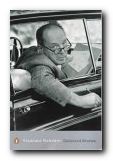a critical examination of Nabokov’s collected stories
 With ‘In Memory of L.I.Shigaev’ (April 1934) Nabokov returns for his subject to the Dostoyevskian figure of the neurotic petty-bourgeois. Viktor works in an émigré publishing house but is sacked for persistent lateness. He goes to pieces, takes to drink, and begins to have hallucinations of ugly creatures crawling around him in the squalid room he rents.
With ‘In Memory of L.I.Shigaev’ (April 1934) Nabokov returns for his subject to the Dostoyevskian figure of the neurotic petty-bourgeois. Viktor works in an émigré publishing house but is sacked for persistent lateness. He goes to pieces, takes to drink, and begins to have hallucinations of ugly creatures crawling around him in the squalid room he rents.
When he is thrown out of his lodgings, he is rescued by the eponymous Shigaev – a helpful, generous, but not very imaginative Russian bachelor. Viktor recovers, but when Shigaev leaves to take up a job in Prague Viktor sinks back into the moral quagmire from which he had emerged: ‘My life is a perpetual good-bye to objects and people, that often do not pay the least attention to my bitter, brief, insane salutation’ (TD,p.168).
The story is short, but curiously unsatisfactory in a number of senses. Andrew Field discusses it alongside ‘The Eye’ as a piece in which Nabokov is exploring alienated and neurotic narrators (LA,p.223) and certainly at the outset it appears that Nabokov is setting up Viktor as unreliable. In a first person narrative, he describes his appalling behaviour to a girlfriend who has chosen another man: ‘It all ended with the circuslike whump of a monstrous box on the ear with which I knocked down the traitress’ (p.160). But then he tells us that this may not in fact be a truthful account: ‘this is but one of the conceivable versions of my parting with her’ (p.160).
We take the point, but then no further use is made of this unreliability. The only subsequent statement he makes which the reader is in a position to judge independently is when he wonders ‘What, then, was the secret of his [Shigaev’s] charm, if everything about him was so dull?’ (p.167). It is obvious to readers that this charm lies in his kindness and helpfulness to others – something Viktor will never understand.
The majority of the story is taken up with Viktor’s account of his alcoholic dementia and the character sketch of Shigaev. Herein lie two further principal weakness of the story. First the description of the ‘clammy mass of thick-skinned clods’ (p.163) which haunt Viktor goes on far too long. Secondly, there is no meaningful relationship between these hallucinations and Shigaev. The demand for internal coherence in the short story is very strong: elements which have no logical or necessary connection with each other breach the need for harmonisation.
Nabokov has Viktor call his DTs ‘the most Russian of all hallucinations’ (p.161) and it is obvious that we are being invited to regard Shigaev as a positive example of Russian society, but any relationship between them is as tenuous as that. The story may have been intended as a demonstration of Viktor’s failure, in his neurotic self-obsession, to give a coherent account of his experience; but in choosing the first person mode Nabokov for once fails to provide any compensating authorial coherence of his own. It is just possible, though unlikely, that the lack of formal coherence in the narrative is supposed to reflect the imbalance of Viktor’s mind. But if it does so, it illustrates that neurosis is not of itself aesthetically interesting.
© Roy Johnson 2005
![]() Vladimir Nabokov: The Collected Stories – Amazon UK
Vladimir Nabokov: The Collected Stories – Amazon UK
![]() Vladimir Nabokov: The Collected Stories – Amazon US
Vladimir Nabokov: The Collected Stories – Amazon US
Vladimir Nabokov web links
Vladimir Nabokov greatest works
Vladimir Nabokov criticism
Vladimir Nabokov life and works